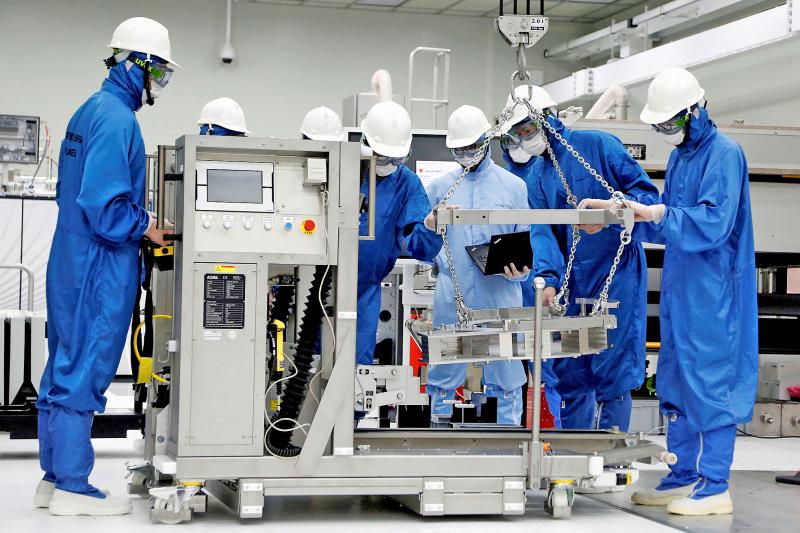Intel Corp yesterday said it has placed its first order with ASML Holding NV to purchase the semiconductor industry’s first TWINSCAN EXE: 5200 system, as the US chip giant aims to compete with Taiwan Semiconductor Manufacturing Co (TSMC, 台積電) in advancing to 2-nanometer process technology.
The Dutch semiconductor equipment maker’s TWINSCAN EXE:5200 system is an extreme ultraviolet (EUV) high-volume production system with a high numerical aperture (NA) that can produce 220 wafers per hour, more than the 150 wafers that its previous generation TWINSCAN EXE:5000 system can handle.
ASML aims to launch the new system in 2024.

Photo: Reuters
ASML president and chief technology officer Martin van den Brink said in a statement that the new system “delivers continued lithographic improvements at reduced complexity, cost, cycle time and energy that the chip industry needs to drive affordable scaling well into the next decade.”
Announcing the deal in a statement, Intel executive vice president and general manager of technology development Ann Kelleher said: “Working closely with ASML, we will harness high-NA EUV’s high-resolution patterning as one of the ways we continue Moore’s Law and maintain our strong history of progression down to the smallest of geometries.”
Intel was the first to purchase the TWINSCAN EXE:5000 system in 2018.
The company said that the new purchase reflects its continued collaboration with ASML and marks the beginning of its production with the new technology in 2025.
TSMC is also likely to buy the TWINSCAN EXE:5200 system and is expected to be the first in the industry to introduce 2-nanometer production, a supply chain source told the Taipei Times yesterday.
“Placing the first order does not mean Intel will be the first to massively produce chips with the tool,” the source said, adding that Intel still has a long way to go before catching up with TSMC in commercializing 2-nanometer technology.
TSMC’s 2-nanometer chips would enter the market in 2025, the firm said, adding that the chips would be the highest-performing chips available.
Separately, ASML yesterday said that it did not expect a factory fire in Germany to disrupt output.
The fire at its Berlin facility early this month was extinguished within two hours, and the company still expects to ship about 55 EUV systems this year, it said.
“We were able to put the fire out in a couple of hours, but still there was significant damage,” ASML chief executive officer Peter Wennink said in a statement. “Because of the hard work and the creativity, we currently believe that we can manage the situation and that we will not see a significant impact on our EUV output in the year 2022.”
Wennink said demand is 40 to 50 percent above the ASML’s maximum capacity, and it would take “two to three years to get a nice balance between supply and demand.”
The firm’s shipments would increase next year, he added.
Additional reporting by Bloomberg

NEW IDENTITY: Known for its software, India has expanded into hardware, with its semiconductor industry growing from US$38bn in 2023 to US$45bn to US$50bn India on Saturday inaugurated its first semiconductor assembly and test facility, a milestone in the government’s push to reduce dependence on foreign chipmakers and stake a claim in a sector dominated by China. Indian Prime Minister Narendra Modi opened US firm Micron Technology Inc’s semiconductor assembly, test and packaging unit in his home state of Gujarat, hailing the “dawn of a new era” for India’s technology ambitions. “When young Indians look back in the future, they will see this decade as the turning point in our tech future,” Modi told the event, which was broadcast on his YouTube channel. The plant would convert

‘SEISMIC SHIFT’: The researcher forecast there would be about 1.1 billion mobile shipments this year, down from 1.26 billion the prior year and erasing years of gains The global smartphone market is expected to contract 12.9 percent this year due to the unprecedented memorychip shortage, marking “a crisis like no other,” researcher International Data Corp (IDC) said. The new forecast, a dramatic revision down from earlier estimates, gives the latest accounting of the ongoing memory crunch that is affecting every corner of the electronics industry. The demand for advanced memory to power artificial intelligence (AI) tasks has drained global supply until well into next year and jeopardizes the business model of many smartphone makers. IDC forecast about 1.1 billion mobile shipments this year, down from 1.26 billion the prior

People stand in a Pokemon store in Tokyo on Thursday. One of the world highest-grossing franchises is celebrated its 30th anniversary yesterday.

Zimbabwe’s ban on raw lithium exports is forcing Chinese miners to rethink their strategy, speeding up plans to process the metal locally instead of shipping it to China’s vast rechargeable battery industry. The country is Africa’s largest lithium producer and has one of the world’s largest reserves, according to the US Geological Survey (USGS). Zimbabwe already banned the export of lithium ore in 2022 and last year announced it would halt exports of lithium concentrates from January next year. However, on Wednesday it imposed the ban with immediate effect, leaving unclear what the lithium mining sector would do in the